Today, he’s appealing lower court decisions that denied Tommy and Kiko habeas corpus, the writ that springs a prisoner from illegal detention, and that if granted, would force the chimps’ owners to free them. He doesn’t get a minute into his argument before the fusillade commences.
“You’ve had the opportunity to be before every other judicial department in this state, and yet you’re before us,” presiding Justice Dianne Renwick interrupts. “Why isn’t this forum-shopping?”
Wise, in a respectful tone that starts quietly and becomes audible as he presses his case, says one lower court decision he’s appealing declared that to qualify for habeas corpus, Tommy would have to be able to fulfill duties and responsibilities, as humans do. That “irrational” rule, Wise says, “places millions of New Yorkers at risk that their personhood will not be respected, either,” from children to the infirm who can’t assume duties.
“We’re asking for the rights of persons, for chimps,” he says. “And that does not mean declaring them a human being.”
Another judge demands to know when the word “person” has “been used to indicate a nonhuman.” Wise replies that courts historically have deemed partnerships and even ships as legal persons (the latter since the 19th century; in cases where the owners were absentee, vessels were assigned responsibility for accidents, with damages set according to their value). He concedes that “there is no case law specifically with respect to chimpanzees.”
“Lions, tigers, any case law as to any other animal?” a justice presses. No. Renwick bores in: “Why isn’t this issue better dealt with by the legislature?” The judiciary “is a coequal branch,” Wise answers, adding that “the courts have taken the lead in numerous instances.” He cites Lord Mansfield, the English jurist who in 1772 granted habeas corpus to a black slave, then viewed as less human than whites, marking a landmark step in dismantling human captivity.
The justices also question whether habeas corpus is appropriate in this case, as Wise isn’t seeking absolute freedom for his clients. Now kept in cages, he says, they would be transferred to an outdoor sanctuary for chimpanzees; obviously, for their own safety, they would not “be driven to Times Square and be let out.”
As people file out after the hearing, a supporter harrumphs about the justices’ relentless interruptions. In a postmortem in the basement, however, Wise assures his small crowd of backers that skeptical probing is not necessarily a barometer of their thinking. “Some cases I thought I lost, I won. Some I thought I won, I lost.…We feel confident that our argument is built from a foundation of justice.”
Three months later, the New York judges ruled there was no legal precedent for chimpanzees to be considered people and denied Wise’s request for habeas corpus. Wise plans to take the case to the state’s highest court, the Court of Appeals.

Photo by Jackie Ricciardi

Animal Rescue
Tommy is owned by Patrick Lavery, who sells trailers for transporting animals and who acquired the chimp from a circus owner living on his property. When Wise first saw Tommy, the animal was alone in a small cage in a dark shed reeking of bad milk; Lavery says that Tommy prefers solitude and likes to watch his TV and listen to his stereo. Yet after Wise saw Tommy’s living conditions, according to a New York Times writer who accompanied him, the lawyer said with a “quavering” voice, “I’m not going to be able to get that image out of my mind.…That’s a dungeon.”
Kiko’s owners, Carmen and Christine Presti, run a nonprofit, the Primate Sanctuary. To the best of its knowledge, the NhRP says on its website, Kiko “is held in a cage in a cement storefront attached to the Prestis’ house.”
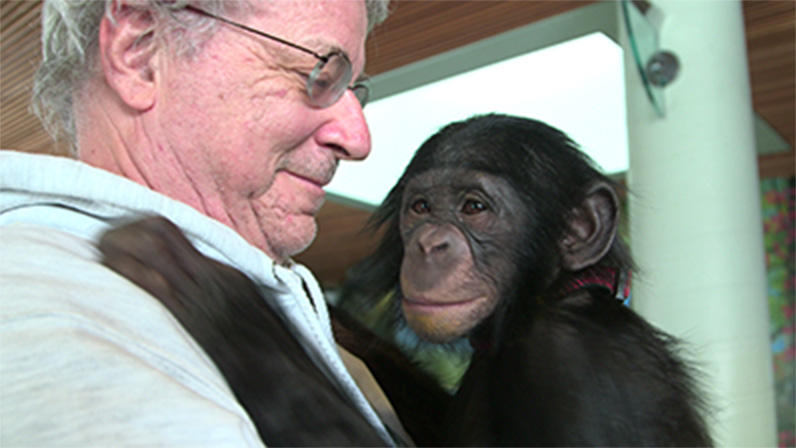
Steven Wise, who regularly visits the world’s foremost primatologists, with a friend at the Iowa Primate Learning Sanctuary. Photo courtesy of Pennebaker Hegedus Films
Two years ago, the group represented a pair of chimpanzees named Hercules and Leo. A judge declined to free those two, who were being used in locomotion research at New York’s Stony Brook University, citing an earlier court ruling that habeas corpus applies only to humans. Wise says the pair were no more than three years old when taken from their mothers and caged in the basement of a computer building at Stony Brook, where experiments “involved having fine wires inserted in their muscles. Worse, they were forced to undergo general anesthesia once every month to six weeks, for years.” Stony Brook subsequently returned Hercules and Leo to their owner, a research center at the University of Louisiana, and the NhRP is now seeking their transfer to a chimp sanctuary.
As appalled as Wise is at such treatment of animals, the NhRP doesn’t claim that any of the owners violate cruelty laws. Wise’s argument is that humans should not have the right to keep them at all, because chimpanzees are autonomous beings with advanced minds that make them suffer in captivity, especially solitary confinement, just as a human locked in a cage would suffer. The NhRP has compiled 200 pages of affidavits from leading primatologists worldwide backing those assertions.
Wise argues that humans should not have the right to keep chimpanzees at all, because chimpanzees have advanced minds that make them suffer in captivity.
James R. Anderson, a psychologist and animal behavior specialist at Scotland’s University of Stirling, has written that “no other species comes so close to humans in self-awareness and language abilities, and in diversity of behaviors such as tool-use, gestural communication, social learning, and reactions to death.” Anderson says chimps recognize themselves in mirrors, which “requires holding a mental representation of what one looks like from another visual perspective.” They are empathetic, consoling each other and watching out for each other at road crossings. They plan for the future, as when they bring stones to different places to use for breaking open nuts. They’ve been observed caring for a dying group member, testing her for signs of life as she died, and cleansing the body. Chimps not only mimic each other’s facial expressions, but contagiously yawn as we do.
“Like humans, chimpanzees have a concept of their personal past and future,” the NhRP argues in court papers filed in Tommy’s case, “…they suffer the pain of not being able to fulfill their needs or move around as they wish….They suffer the pain of anticipating never-ending confinement.” And while no court has yet granted Wise his grail of chimp personhood, he is convinced that “the world is going our way rapidly.”
Recent events support that thesis. The National Institutes of Health has discontinued funding for chimpanzee research, and the agency is gradually releasing its 360 chimpanzees into a federal sanctuary. The government said medical researchers no longer need chimps, and can now use mice and rats that are genetically altered so that their immune systems more closely resemble humans.
Other species deemed rights-worthy by the NhRP also are getting a second look. SeaWorld stopped breeding orcas for shows after customer boycotts, driven by questions about whether captivity unhinged an orca that killed two trainers. And Ringling Bros. and Barnum & Bailey Circus, closed in May after almost a century and a half because of ebbing ticket sales, blamed its plight in part on its discontinuing elephant acts. That decision bowed to customers and activists moved by, among other things, cognition science showing that the popular pachyderms, in National Geographic’s words, “are intelligent and sensitive, that they mourn their dead.”
Last year, Wise notes, an Argentinian judge freed a zoo-held chimpanzee, citing “the species’ own rights: development and life in their natural habitat.”
Wise himself achieved some degree of celebrity in 2016 after filmmakers D. A. Pennebaker and Chris Hegedus (The War Room, Don’t Look Back) released Unlocking the Cage, a sympathetic documentary about his legal quest. At one point, the film references a 2015 Gallup poll suggesting that one-third of Americans believe animals and humans should have the same rights. “I don’t even think that’s true,” marvels Wise, who seeks only limited rights for a limited number of species.

The Jungle Gym
Had it looked only at his grades, Wise says, the BU School of Law might never have admitted him. When the University publicized the grade point averages for students in his entering class, they ranged “from a 2.8 to a 4.0—and I had a 2.8.” Fortunately, he aced the LSAT. A socially conscious student who’d protested the Vietnam War as a William & Mary undergraduate, he found a new channel for that commitment to justice a few years after his LAW commencement, when he picked up Peter Singer’s book Animal Liberation.
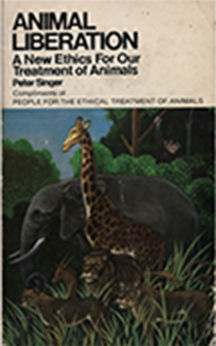
The Princeton philosopher’s 1975 manifesto argued that animals deserve certain rights based on their ability to suffer. It persuaded the young lawyer to become a vegetarian and to take on animal welfare cases, such as trying to spare dogs from death after they’d been deemed nuisances or dangerous.
In 1990, Wise began teaching one of the country’s first animal law classes, at Vermont Law School. The following year, he sued the New England Aquarium on behalf of a dolphin, alleging that the aquarium violated mammal protection law by sending the creature to Hawaii for training at a Navy center. The judge tossed out the suit, saying the dolphin had no standing because it couldn’t testify to any injury it might have suffered.

Wise told Harvard Law students that he takes his case to the states where courts are most likely to agree with his argument. Photo by Jackie Ricciardi
With that decision, Wise says, a mental lightbulb went on: absent legal personhood, even advanced animals were helpless against mistreatment. He realized that a rights wall separates “legal persons” from “legal things,” he says, and “a thing is invisible. All nonhuman animals are on the things side of the wall.” In 2000, he published Rattling the Cage, a book making the case for legal personhood for chimpanzees and bonobos. Wise founded the NhRP seven years later in his home state of Florida. The group, whose $900,000 budget is financed by grants and donations from foundations and individuals, has six full-time and three part-time workers (two of the latter are lawyers). It has relied on more than 25 lawyers and law students for legal research over the four years it has litigated the chimp cases. Also donating their time are 18 experts on ape, elephant, and orca cognition.
Wise credits former LAW faculty member Daniel Coquillette with teaching him legal history, a discipline, he says, that makes the claim of personhood for chimps seem less radical. Animals have been tried—and often provided with lawyers—as far back as medieval times, for such crimes as killing people or destroying crops. NhRP’s court work cites cases from the Middle Ages through the Enlightenment.
History started his quest, and stamina keeps it going. For talks during a two-week period this spring, he hopscotched from Georgia to Ohio to New York before alighting in a lecture hall at Harvard Law School. A voluble speaker, Wise got so wrapped up in chronicling his career and explaining the methodical preparation of his cases that he filled up his allotted hour-and-a-half slot, leaving scant time for questions.
One judge dismissed a lawsuit against the New England Aquarium, saying a dolphin had no standing because it couldn’t testify to any injury that it might have suffered.
He filed his first legal personhood case 13 years after Rattling the Cage came out, he told the Ivy League crowd, and in between he and his team had to figure out which law to sue under, what precisely to seek under that law, and the right jurisdiction. They chose common law, which looks to precedent and past judicial decisions, because that law is intended to be “inherently flexible,” he said, evolving with changing public morality and scientific knowledge. Next, the NhRP settled on habeas corpus writs, he said, because they permit the organization to seek chimps’ freedom without demonstrating “standing”—that is, that the NhRP had been hurt by the defendants’ actions. The herculean task of choosing the right venue required an effort to predict how courts in every state, the District of Columbia, Puerto Rico, and 20 other countries might react to 50 or 60 legal questions.
On Easter 2013, as his team reviewed their data, “New York came to the top,” he told the Harvard folks. “We really, really liked the way the courts talked about habeas corpus, and we really liked the way the courts talked about autonomy.”
The charge of forum-shopping elicited no apologies. “What do they want us to do?” he said. “Go in states in which we don’t think we have a chance of winning? Or just kind of throw a dart at a dartboard? Because each of the 50 states has dramatically different law, we have to go into the state in which we think we can best begin.”

Photo by Jackie Ricciardi

Second Opinions
For Wise’s many skeptics, legal personhood poses practical concerns, starting with whether it wouldn’t be preferable to just tighten animal cruelty laws. Wise replies that such laws are unavoidably impotent. “We’re still in the position of, we’re the masters, they’re the slaves,” he says. “We still kill them, we still exploit them.” And if someone violates a cruelty law, chimps (or their human representatives) can’t sue to stop it; they need law enforcement to step in, which may or may not happen.
He asks humans to put themselves in the animal’s place: “why don’t we just take away all of your rights, and we’re going to have a statute that says it’s a crime for people to be cruel to you. Would you think that your fundamental interests were being protected?”
New York University’s Richard Epstein is among the many legal scholars who disagree, strongly. “There is no sensible policy objective that can be achieved by giving chimps legal personhood,” he says, “especially since human persons always have to speak for them.” If anything, protection laws for lab animals “may be too effective,” Epstein says. “Wise cares chiefly about chimps, and their protection has been strengthened pretty much across the board” as other means of medical research advance. “I would want to be sure that freeing chimps has not slowed research down,” he adds. “It could be done for other reasons, and these may well be valid.”
Epstein says Wise’s analogy between granting animals rights in the way we do corporations and partnerships “is way off base. The corporation has individuals as members,” he says, “and giving it rights is a way to economize on the costs of those rights” as well as protecting those rights. “There is no corporation that has only animals as its shareholders, without human guardians.”
Wise concedes that cognition science at present justifies legal rights only for a limited number of species. But he also believes that “whether medical research is lifesaving is not the criterion for determining whether an entity should be recognized as a legal person. If it were, we would use human beings in biomedical research against their will. Rather, we look at the nature of the subject and whether she has the legal right not to be used.…A good rule of thumb is that a nonhuman animal possessed of fundamental legal rights may be used in biomedical research in the same way in which a human child may be used, with similar safeguards.”
Harvard Law lecturer Jonathan Lovvorn is skeptical of Gallup’s finding that one-third of Americans want human rights for animals. If that were true, he says, those respondents would be vegans, since it’s a human right not to be served up as the blue-plate special, and yet just 3.4 percent of Americans are vegetarian in any form. Lovvorn, who is chief counsel for animal protection at the Humane Society of the United States, has written that society is just not ready for the radical notion of animal personhood.
At the same time, Christopher Green, executive director of Harvard’s Animal Law & Policy Program, says Wise’s opinions changed his life. Green had left Harvard Law to attend veterinary school until he learned that Wise would be teaching Harvard’s first animal law class. (At the time, only 9 law schools had offered such classes, Green says; today it’s more than 160.) He reenrolled to take the class and became a believer in the legal personhood cause.
“I think there is no question that Steve Wise is one of the foremost pioneers in the field,” his former student says, adding that Rattling the Cage is “the foundational text of animal law.”
Following his Harvard talk, Wise chats about some of the things we’ve learned about nonhumans. Animal lives, he said, “are as important to them as our life is to us. Or as important to their families as ours is. If you kill a mother chimpanzee, it means the children are going to die. If you kill the matriarch of an elephant herd, they may all die. The amount of wisdom and knowledge in the repository of the female matriarch is critical to the survival of the entire group.
“The number of nonhuman animals that are killed, as we’re speaking, is fantastic,” he said. “The more we understand about them”—at least higher creatures like the great apes—“the more we realize how extraordinary they are, and that it’s coming close to committing murder on a dramatic scale.”



































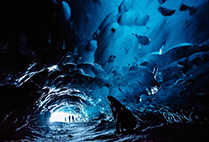


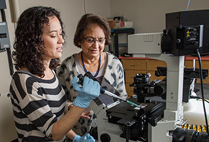













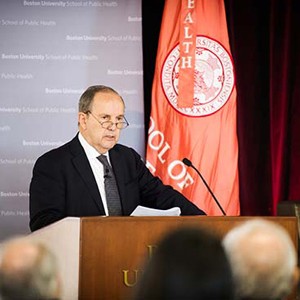


I am sad to think that it is religion that is responsible for the false separation that we have created between humans and other animals. Since reading “Next of Kin” by Roger Fouts, I cannot stop thinking about how similar we are to chimpanzees (and other higher primates). Stephen Wise is a great inspiration and one who- like Jane Goodall and others- is advancing human consciousness incrementally through consistent, patient, inexorable efforts, fueled ultimately by love. There is a religious philosophy consistent with this- as manifested by St. Francis, for instance- but it is out of fashion. It’s “fire and brimstone” and “dominion over the earth” these days.
Bless you, Steve Wise. Bless you for many things…but especially for your persistence on this issue…mary
Anyone who seeks it advance & expand rights, whether civil, human or nonhuman, is a hero. “Though the Heavens may Fall,” Stephen Wise’s book on the 1772 Somerset case, which began the process of ending slavery in Britain, is masterful on its related subject. For Wise, rights are a continuum encompassing homo sapiens along with other higher primates. Let’s have more!
Sadly, we talk about animals as if we aren’t one of them, as if we are above them. Why is this? We are no different than other animals that share this earth, we are in fact animals ourselves. If we really are that much smarter than other animals why is it that we can’t see the hurt and harm we cause them? and the world around us? It sickens me to think of all the animals out there being abused at the hands of so called “smart” people, aka research scientists. I won’t even get into the hunting debate, I can’t understand the thrill of hunting down a defenseless creature with a rifle, how does one feel good about killing a living creature that may have offspring its taking care of with strong bonds loaded with love and affection. And to think we hold these animals captive in cages until they are depressed and unhealthy all so ignorant people can gawk at them from a safe place. Enough is enough already. Its my humble opinion, and perhaps controversial, that if you can’t treat others, including animals, they way you would want them to treat you, then you don’t deserve to live yourself. Animals in captivity today should not be held in cages, they need environments that mimic their own natural environment.
Thank you, Mr. Wise. You are a true hero and make me feel proud of the BU community.
Yet, we do the same thing with elders and financial exploitation – falsely declare them incapacitated, take control of their person, their voice and their civil rights, and appoint guardians with the power to do whatever they want with the elder and assets. How often are an elder’s fundamental interests protected?
How ironic it is to want to grant human rights to non-humans while we grant no rights to unborn human children.
This is an interesting essay.As a species we can save ourselves by developing a new progressive way of interacting with other species on a more equal level.It is not possible for us to make a future for ourselves without this happening. Any other way we try to advance will result in our destruction.This new way of looking at other species as our equals is progressive, exciting and revolutionary.